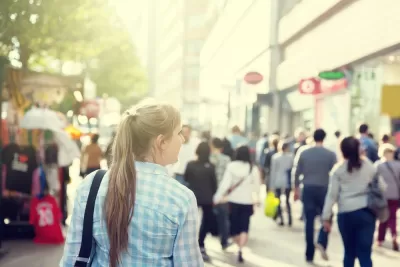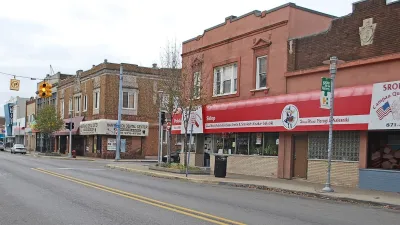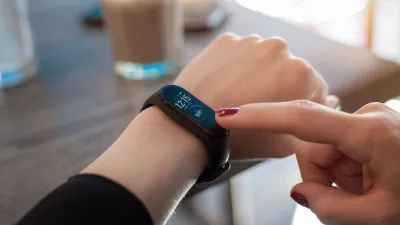An opinion piece highlights the benefits of slow transportation, a luxury seldom available in our speed-obsessed society.

Describing the occasional ritual of walking from work to meet up with friends for post-work drinks, Streetsblog’s Kea Wilson writes that “I enjoy it infinitely more than any trip I take in a car.” Wilson asks the reader to appreciate the joys of slow transportation in a fast-moving world. “American culture, and particularly American transportation culture, is profoundly rooted in the idea that traveling fast is best — because if we don’t, that culture insists, we won’t be able to make or spend money efficiently enough to retain our position as a global economic superpower.”
Wilson understands why many Americans don’t value slowness. “So much of the slowness we experience when we walk, or bike, or take transit in the U.S. is not the kind of glorious, romantic diversions rhapsodized about by 18th-century flâneurs with deep pockets and nowhere to be.” It is, most likely, a miserable wait for a bus that never comes, a longer-than-expected trip for a few basic necessities, or being late to work through no fault of your own.
Wilson contrasts this with “chosen slowness,” which can help regulate your nervous system by giving you time to unwind during an open-air walk or bike ride, for example. “It’s the pleasure of movement itself, in a society that would probably teleport us all directly to the places where we work or consume, if we could just find a way to make teleportation profitable.” Wilson admits this is a privilege few can afford.
Ultimately, Wilson argues that the American obsession with speed skews toward consumption. “A fast bus — or a fast train, or a protected bike path that carries you quickly downtown without cheating through twenty low-traffic neighborhoods — might move fast, sure, but the people on board it don’t consume quickly enough.” Moving at your chosen pace for its own benefit, Wilson argues, should be a right unto itself.
FULL STORY: Opinion: Slow Transportation Should Be a Human Right

Planetizen Federal Action Tracker
A weekly monitor of how Trump’s orders and actions are impacting planners and planning in America.

The Simple Legislative Tool Transforming Vacant Downtowns
In California, Michigan and Georgia, an easy win is bringing dollars — and delight — back to city centers.

San Francisco's School District Spent $105M To Build Affordable Housing for Teachers — And That's Just the Beginning
SFUSD joins a growing list of school districts using their land holdings to address housing affordability challenges faced by their own employees.

In More Metros Than You’d Think, Suburbs are Now More Expensive Than the City
If you're moving to the burbs to save on square footage, data shows you should think again.

The States Losing Rural Delivery Rooms at an Alarming Pace
In some states, as few as 9% of rural hospitals still deliver babies. As a result, rising pre-term births, no adequate pre-term care and "harrowing" close calls are a growing reality.

The Small South Asian Republic Going all in on EVs
Thanks to one simple policy change less than five years ago, 65% of new cars in this Himalayan country are now electric.
Urban Design for Planners 1: Software Tools
This six-course series explores essential urban design concepts using open source software and equips planners with the tools they need to participate fully in the urban design process.
Planning for Universal Design
Learn the tools for implementing Universal Design in planning regulations.
Smith Gee Studio
City of Charlotte
City of Camden Redevelopment Agency
City of Astoria
Transportation Research & Education Center (TREC) at Portland State University
US High Speed Rail Association
City of Camden Redevelopment Agency
Municipality of Princeton (NJ)





























